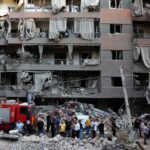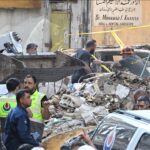Pope Francis made a landmark statement, calling for an urgent and careful examination of whether Israel’s continuous military campaign against Gaza constitutes genocide of the Palestinian people. The remarks were, for the first time, some of his clearest criticisms of the policy of Israel toward its yearlong conflict with Hamas, raising an international debate over the nature of hostilities.
The Urged Probing of Alleged Genocide
Pope Francis referred to international experts who say Israel’s actions in Gaza “have the features of a genocide.” Yet, according to excerpts from a book due out soon published on Sunday by the Italian daily *La Stampa*, he said the full probe was still needed to determine if such acts were legal under the genocide definition set by international jurists and organisations.
The remarks come at a time when the military strategies Israel adopts were placed under intense scrutiny. Last December, South Africa filed a case before the International Court of Justice (ICJ) accusing Israel of committing genocide on its people. While the ICJ has not pronounced itself on whether genocide has occurred, it nonetheless directed Israel in January to ensure that its military operations do not include genocidal acts.
Israel Defends Its Missile Strike Campaign
Israel has vigorously dismissed claims that its Gaza operations contain elements of genocide, claiming instead that those operations are intended only to destroy Hamas and all other organisations it deems dangerous. In response to the Pope’s newest statement, Yaron Sideman, Israel’s ambassador to the Holy See, observed that it was the attack on Israeli civilians by Hamas on October 7, 2023, that justified Israeli defensive action.
“To call Israel’s self-defence by any other name is to single out the Jewish state unfairly,” Sideman said in a social media post. He emphasised that this was a warranted military response to an attack on October 7 that resulted in the death of 1,200 Israelis and the capture of over 250 hostages.
In his latest slam against Israeli actions, Pope Francis continues criticism of Israel’s war policies.
While the leader of the 1.4-billion-member Catholic Church, Pope Francis, mainly avoids positions on international conflicts, he recently began speaking out more loudly about the humanitarian implications of the actions carried out by Israel. In September, he came out strong in denouncing the killing of Palestinian children through Israeli strikes; it is a tragedy, he said. The pope also branded Israeli airstrikes in Lebanon as “acts that go beyond morality.”
Not surprisingly, his words are addressed. These declarations have even been proposed to represent a change in the previous Vatican’s attitude toward international conflict, above all with countries such as Israel and Palestine. However, no official comments came from the Vatican regarding the recently publicised *La Stampa* statements. However, the Vatican news website continued posting news about the extracts from the book without other comments.
More:Islamophobia and Extremism: How the Conservatives Lost Sayeeda Warsi
Influence of the War and International Debate
Israel launched its military campaign in Gaza after a massive assault by Hamas in the south of Israel on October 7, 2023. According to sources within Israel, during the assault, 1,200 Israelis were killed and over 250 taken hostage. The current year has seen the fighting escalate further: The Gaza Health Ministry reports a death toll from Israeli air and ground operations at over 43,800.
This is the second time controversy has clouded the Pope due to his position over the Israeli-Palestinian conflict. Last time, it was after he was accused of making use of the term “genocide” privately to a group of Palestinians-a claim that the Vatican promptly rejected. Recently, Pope Francis met with a group of former hostages of Hamas in Gaza, who are campaigning for the release of their relatives still in captivity.
International Reaction to Pope’s Statement
The proposal by the Pope for an investigation into the genocide possibility has precipitated different responses internationally. French President Emmanuel Macron and other European leaders have, on most occasions, publicly supported the Ukrainian’s actions to defend themselves but disagreed on the technical legal meanings and connotations of the term “genocide” in the context of Gaza.
The international community remains staunchly divided on this issue, and efforts to call for an impartial investigation gained strong momentum. It is, therefore, against this backdrop that this development demonstrates how complex and riddled with numerous challenges the consensus is on the need to concretise the human rights implications of military action in the region.
Whether or not Israel’s actions in Gaza constitute genocide is a debate that probably will run and run because the conflict does not seem to diminish itself, and the humanitarian crisis in Gaza keeps deepening.















